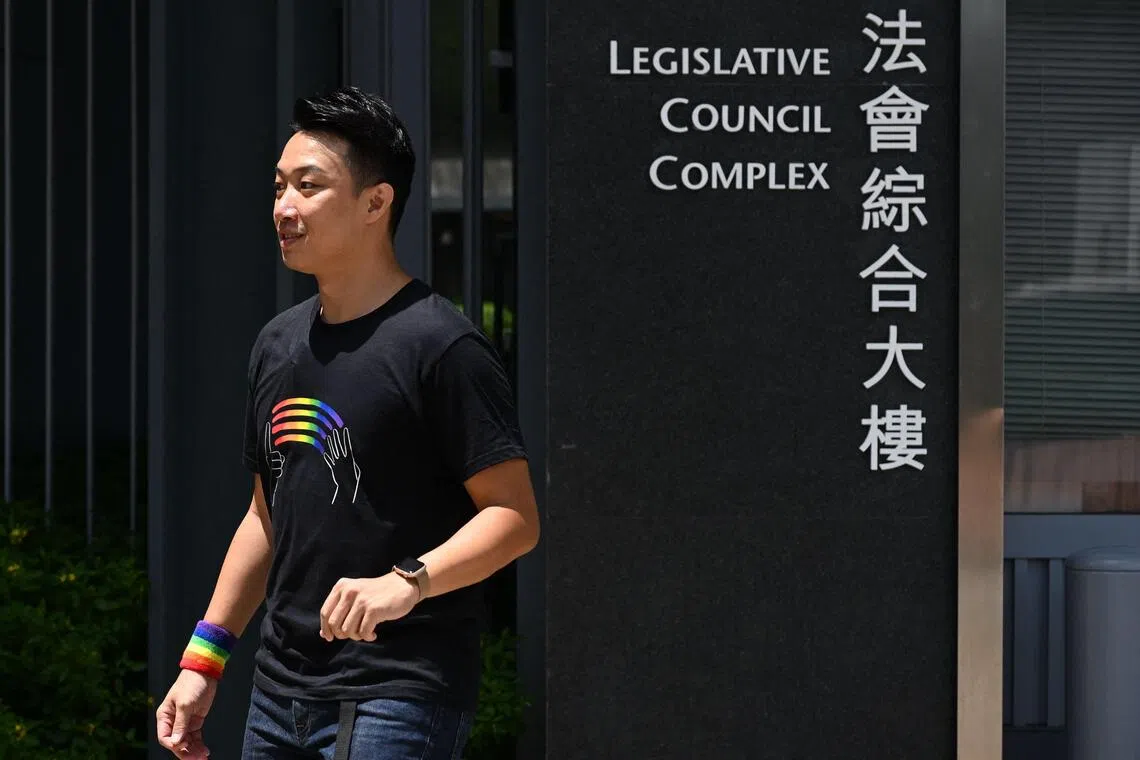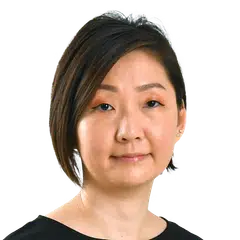As election looms in Hong Kong, a slew of incumbents are pulling out of the race
Sign up now: Get insights on Asia's fast-moving developments

Beijing in 2021 overhauled Hong Kong’s electoral system, requiring all candidates to first prove their patriotism to a pro-Beijing vetting panel before they are allowed to run for election.
PHOTO: AFP
Follow topic:
HONG KONG – Just before Hong Kong begins nominations for its December Legislative Council (LegCo) election, a quarter of its 89 incumbent lawmakers have already bowed out of the race.
Twenty-two lawmakers have announced their decision not to run for re-election in the Dec 7 polls, for which a two-week nomination period starts on Oct 24.
Their decision comes amid talk that Beijing is seeking to rejuvenate the city’s “patriots only” legislature and has set an age limit for those who will serve in the new term.
Ten of the incumbents not seeking re-election are aged at least 70, while the rest are all younger.
Those who have decided not to run cite plans to return to their previous work or to focus on other ways of contributing to their communities. Only two sitting legislators aged 70 and above have yet to make clear if they will run: Mrs Regina Ip, 75, and Mr Lai Tung Kwok, 73, both of whom are former security ministers.
Mrs Ip – a vocal, sometimes-controversial lawmaker who has previously supported a Bill to recognise some rights for same-sex unions
But that now seems uncertain.
Mrs Ip made the news on Oct 13 when she appeared visibly upset by reporters’ repeated questions on whether she would run, curtly telling them to “move aside; stop harassing me”.
Hong Kong media cite anonymous political sources as saying that septuagenarian legislators are being pressured to step down as those aged above 70 will be barred from the race.
These reports have been followed by a flurry of announcements from veteran lawmakers that they will not be seeking re-election, including from the outspoken founder of fashion label G2000, Mr Michael Tien, 75, who was previously also seen as unlikely to step down.
Mr Tien was in 2019 the first pro-establishment lawmaker to urge the government to drop a controversial extradition Bill that later sparked mass protests across the city.
On Oct 22, another vocal legislator, 55-year-old solicitor Doreen Kong – who has often expressed opposing or alternative views on many of the government’s policies – became the latest to say she will not seek another term in office.
Mr Tik Chi Yuen, 68, the city’s sole legislator who is not pro-Beijing, has also said he will not run.
The lawmakers’ exodus from the race can be attributed to four main factors: age, performance, how outspoken they were, and their party affiliations, according to veteran political commentator Yu Kam Yin in his column in the Hong Kong Economic Journal.
All those who have bowed out so far have denied or declined comment on claims that they were pressured to do so. The Hong Kong and Macau Affairs Office, Beijing’s top unit overseeing the city, on Oct 17 said it does not grant any “blessings” or “special treatment” to candidates.
“But let’s face it,” Prof Burns told The Straits Times. “The LegCo elections are curated by the central authorities in Beijing to achieve the result they want.”
Beijing in 2021 overhauled Hong Kong’s electoral system, requiring all candidates to first prove their patriotism to a pro-Beijing vetting panel before they are allowed to run for election. The move has wiped out virtually all democratic representation in the legislature.
“The new environment (under the revamped electoral system) is one in which the LegCo is expected to not just coordinate with the Chief Executive’s administration, but to also cooperate with it – from a position of subordination,” Prof Burns said.
Echoing his view, veteran politician Tam Yiu Chung – a former Hong Kong delegate to China’s de facto legislature, the National People’s Congress Standing Committee – told a recent TV programme that the city’s lawmakers should help the government achieve its goals, rather than constantly criticise its policies.
The incumbent LegCo has passed all but one of 130 Bills put forth by the government. The sole Bill rejected
While today’s LegCo appears more efficient without the filibustering that once dominated its proceedings, a survey in March found that nearly half of 1,000 Hong Kongers polled were dissatisfied with it, seeing the lawmakers as “too passive” and working only to please Beijing.
The legislature’s “ageing problem” is probably the least of ordinary Hong Kongers’ concerns, according to Mr Chris Yeung, founder of independent opinion platform Voice of Hong Kong.
“The problems of LegCo lie more with its sharp decline of its capability in exercising effective checks and balances over the executive authorities,” he said. “The room for them to do so is limited for obvious reasons.”
With the elimination of so many incumbent lawmakers from the upcoming election, Beijing loyalist Tam hailed the legislature’s impending renewal.
“It’s a valuable opportunity for newcomers to gain experience,” he said. “For those who have long served their communities, running for LegCo can be seen as taking a step forward.”
While having newer, younger lawmakers is important for continuity, Prof Burns said that in Beijing’s eyes, what is more crucial is for the aspiring legislators to exhibit “a willingness to accept the central authority’s discipline”.
He expects the new legislature to boast more members who are “in some way connected with China’s state-owned enterprises”, as has been the case among the city’s district councillors.
The move, he said, would give Beijing more control over the politicians via their employers, and also ensure that they can be granted enough time and funds for their community work.
“Those good district councillors among this pool of people can be promoted to LegCo, and may even become senior government officials in the future,” Prof Burns said.
“I think it’s fair to say that Beijing is playing a long game.”


